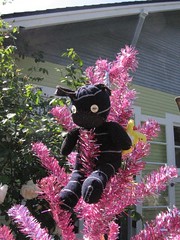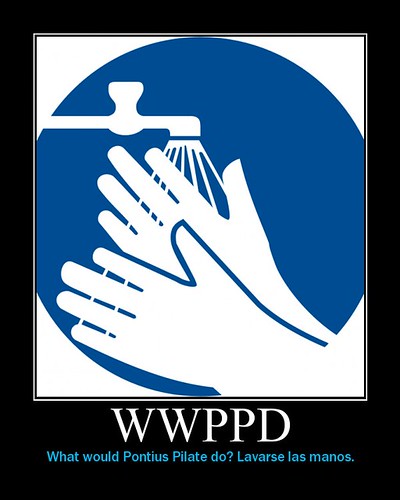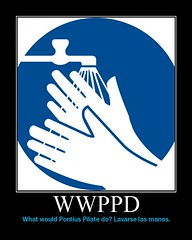By request, here is the recipe, from Lynne Rossetto Kasper's book, The Splendid Table.
I made about a batch-and-a-half. Looking at the recipe, I realize now that I forgot the olive oil. Crap.
1 quart white wine vinegar (I buy white wine vinegar in gallon jugs, for canning.)
2 2/3 cups water
1/2 cup olive oil (It specifies extra-virgin, but do people actually use any other kind in the U.S.A?)
1 tablespoon coarse salt
1/4 cup sugar (I cut this back, as I do the sugar in most recipes. I also used raw sugar, for the extra taste.)
1/2 teaspoon black pepper
1 1/2 teaspoons fresh chopped basil or 1/2 teaspoon dried basil
3 medium red bell peppers,
3 medium yellow bell peppers, cut into 1/2-inch wide strips (I used 4 red bell peppers, because that's what I had, cut into half-inch wide and 1 1/2-inch long chunks, because I like the pieces smaller.)
1/2 medium-sized cauliflower, cut into bite-size flowerettes (I used 2 heads of organic cauliflower, which was a beautiful golden color that is unfortunately obscured by the balsamic vinegar in the finished product here.)
8-10 pearl onions (I just used a regular onion, chunked, because pearl onions are hard to peel, and I didn't have any on hand. I also put whole peeled garlic cloves, because that's the kind of gal I am: garlicky.)
1/3 cup balsamic vinegar
It says these need to be made at least 3 days ahead (so the vegetables actually marinate). It also says they last 3 weeks in the fridge, but they last much much longer if you put them into hot, clean jars. By "much much longer" I mean "months."
Combine ingredients other than vegetables and balsamic vinegar. Bring to a boil and simmer 2 or three minutes.
Drop the peppers and cauliflower into the marinade, bring back to a boil, cook (uncovered) 2 to 3 minutes (I cooked it a bit longer, because my cauliflower pieces were maybe more than "bite-sized" and I wanted them to get tender). Remove with slotted spoon and set aside (or, as I did, put them into an enormous jar). Add the onions (and in my case, the garlic) to the marinade and cook 5 minutes or until barely tender. Remove with slotted spoon and add to vegetables. Boil the marinade uncovered for 5 minutes. Remove from heat, add balsamic vinegar, and pour over the vegetables, adding more white wine vinegar if you need to in order to cover the vegetables.
Eat them WITH YOUR MOUTH.
Thursday, October 18, 2007
Balsamic Vegetables
Monday, October 15, 2007
Trip

So, the boyfriend's mother is visiting from the Netherlands, and a friend of his is also visiting from the Netherlands, and we are all slated to go in a rented R.V. on a trip. For reasons best known to himself, the boyfriend wants to take us to Eastern Oregon, to Lake Malheur. It looks pretty.

But I think it will be cold. Given my own druthers, I would probably head for more southern climes, such as Arizona. I understand that, for people from a small and crowded country, the basin-and-range areas of Eastern Oregon and Nevada can hold a certain magic. But I would argue that the desert Southwest could be just as magical, and certainly warmer and drier.
I just hope I make it. My unseasonal depression seems--perhaps because unseasonable-- unshakable. What to do, what to do? What to do when nothing helps?
I sort of just want to stay home and hide. I sort of just want to stay home and hide and drink tea and work in the garden a bit. But I hold the romantic hope that travel can change me (I know; I know). I am supposed to leave on Friday, and be gone for nine days or so.
Wednesday, October 03, 2007
Thermopylae

Honor to those who in the life they lead
keep and guard their own Thermopylae.
Never betraying what is right,
consistent and just in all they do
but showing pity also, and compassion;
generous when they're rich, and when they're poor,
still generous in small ways,
still helping as much as they can;
always speaking the truth,
yet without hating those who lie.
And even more honor is due to them
when they foresee (as many do foresee)
that Ephialtis will turn up in the end,
that the Medes will break through after all.
--Constantine P. Cavafy
Translated by
Edmund Keeley & Philip Sherrard
Tuesday, September 11, 2007
All Is Fair...
She moved through the fair.
Her green eyes darted like the wind.
She moved through the fair
As if it were someplace she’d never see again.
She stops and waits.
She stands just beyond the light.
And if heaven calls, she knows she’ll go.
And if not, she’ll be all right.
She moved through the fair.
Her cotton dress was new.
She looked like a queen. --Bill Morrissey
 (Photo by MissyV110)
(Photo by MissyV110)All is Fair in Love
We had planned to go to the fair on September 11. After my dad woke me up that morning and told me to turn on the TV, I took it upon myself to call everyone I could think of. I woke Becky up out of a sound sleep, and she, in a dream-addled voice, asked, “Does that mean we don’t get to go to the fair?”
We couldn’t have gone to the fair that day, even if we hadn’t been stuck in front of the television, watching the same images over and over and over. Governor Gray Davis had ordered a postponement of the fair’s opening day. We went a couple of days later.
They probably would have used hand-held metal detectors to scan us all at the gate anyway, but the process took on an eerie significance. Everything that day was to take on some kind of eerie significance.
I know they have agricultural and craft fairs in other countries. But, for me, there is nothing that makes me feel more American than a fair or a parade.
We went to see the poultry exhibit. I was delighted with the cages full of Spangled Hamburg, Dominique, Cochin, and Polish chickens. I thought of the ingenuity, the centuries of careful breeding and happy accidents, that went into the creation of utility breeds—chickens that are both good laying chickens and good eating chickens. Many of these breeds are now endangered as the poultry industry focuses on specialty chickens with either prodigious laying capacity or giant hormone-pumped meaty muscles. I found myself feeling melancholy in the contemplation of endangered chickens. I hoped that the ingenuity that created them was not also endangered.
 (photo by hen power)
(photo by hen power)We saw the goats and sheep, the horses and cows. We went into Brad’s Reptile World and ogled the exotic animals. We went to the petting zoo and got to stroke a bristly squirming baby pig no bigger than my cat. We saw a big bunny in a cage, with a baby bunny perched exactly on the center of its back. We watched the carnies hustle customers to try the games. We paid for our tickets to bet on the racing pigs. We ate fried things and felt covered with a thin film of grease. We admired the prize-winning pumpkins and lemons, and the vegetables dressed up like animals and people.
There was something about the whole thing that felt bittersweet and a little frightening. It felt odd to be in a crowd when my instinct was to avoid congregations of people. It felt odd to be seeking enjoyment when my instinct was to mourn. It felt odd to worry in such an innocuous situation. But, my illogical mind asked, if terrorists were out to attack symbols of American culture and society, wouldn’t a county fair be a reasonable target?
One room off to the side of the fruit and vegetable building had a display on patents and inventions. There we looked at an exhibit documenting an invention by 1930s Hollywood actress Hedy Lamarr. Her plan was to use radio signals to guide torpedoes. This original purpose never panned out, but her patent is the basis of modern-day satellite communications. I was struck by the weirdness of chance, the coincidence that meant I was reading about Hedy Lamarr at a county fair two days after September 11’s strange intersection of cell phones and war.

All is Fair in War
I was already being told by the media that September 11 was my generation’s Pearl Harbor. I had already formulated my dissent against this characterization: since Pearl Harbor led to the wide-scale relocation and internment of Japanese aliens and Japanese-Americans, and, to a lesser extent, of Italian- and German-Americans, I didn’t like the potential implications of the Pearl Harbor metaphor. Also, the attack on Pearl Harbor was the act of a nation against a military target. September 11 was, as far as we could tell, the attack of a group. And the target had been, for the large part, civilian.
Yet, in some ways, the Pearl Harbor comparison was apt. After Pearl Harbor, residents of California worried they would be next. After September 11, I think that most of us, at one point or another, however fleetingly, worried we might be next. I worried, fleetingly, that I might be next.

Pearl Harbor had its effect on the Santa Cruz county fair, too. In 1941, the fair completed its purchase of the land where it is held to this day, and the first county fair on the site took place in October of that year. On June 11, 1942, six months after Pearl Harbor, the Santa Cruz Sentinel announced that “A series of small fairs or field days will probably replace the annual Santa Cruz county fair this year.” Wartime meant new rules, and the new strategy was that “By having several separate and distinct days for various groups, it is hoped to keep attendance down to a level below that which would bring protest from army and navy officials….10,000 persons saw last year’s fair during four days….the government has clamped down on crowds of such size.” The fair, with its kid’s bicycle day, horse pulling contests, grange presentations, military exhibitions and “grunt and groan” strongman contest was shut down for the duration of the war.
Our war has not shut down the fair this time. There will be a memorial “Moment of Silence” before, ridiculously enough, the Sha-na-na concert. There will probably be a lot of flags. But perhaps not that many more than usual. Fairs, I think, are generally patriotic, even in peacetime.
Homeland
The United States is my home. During an event like the county fair, when the smell of hay and manure pulls me nostalgically back to my childhood spent in a farming town in Colorado, the United States might even be my homeland. But, despite my own pride and rather troubled patriotism, the new Department of Homeland Security gives me the willies. Not necessarily because of its mandated function. Protecting one’s own country seems like it could be a reasonable endeavor. It is the name of the department that creeps me out.
“Homeland” sounds too much like “fatherland,” a phrase that smacks to me of the totalitarian desires of someplace like Third Reich Germany. I would infinitely prefer it if the new department were called “Domestic Security.”

I am domestic. I cook, I clean (sometimes), I can vegetables, I wear an apron. I go to the county fair, and look at the exhibits, hoping to find new recipes for the apples that become so plentiful at the farmers’ market this time of year. I participate in activities like the fair because they make me feel connected to my land, to the bounty of the harvest, to my own pioneer roots.

I want my domestic life to be secure. I want to someday own my own little flock of heirloom utility chickens. I want to feel safe: in my own bed, when I am driving across the Golden Gate Bridge, at the county fair. But I recognize that, since I live in the United States, my domestic position in the world is only supported at the expense of others. My pride is also my shame. I hope this year’s fair helps to remind me of that.
Tuesday, July 03, 2007
Alan Johnston

Kidnapped BBC Gaza reporter Alan Johnston has been freed. So now I can take down the Alan Johnston petition link on my sidebar. I don't always think strongly about things that happen far away, but something about his story struck me. Mostly, I think, that he was doing a good job reporting on a conflict that I find repugnant in almost every way. Therefore, I would like to say thank you to Mr. Johnston, and express my hope that he returns to reporting, if he is able.
Friday, June 22, 2007
Super-Secret Staircases
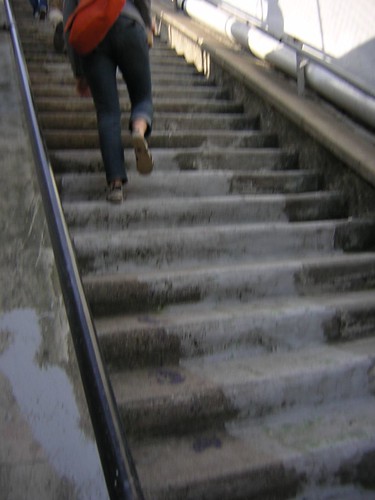
L’esprit d’escalier
Santa Cruz is a town of hills. Perhaps not as evocative as the hills of Rome, or the Ngong Hills of Kenya, the hills of Santa Cruz nonetheless add texture to the landscape. In Colorado, where I grew up, the streets of every small town are tree-lined—an urban forest. When I moved to Santa Cruz almost seventeen years ago, I was disturbed by the relative lack of trees. I felt exposed, like I was in a big parking lot. Over time, however, the hills and their texture came to replace trees for me as a symbol of location, a signifier of “place” over “space.” I began walking, taking long evening strolls, trying to find the places where I could look back and see the town stacked up in layers, with the Santa Cruz Mountains behind. Or places where, from a hill, I could look out across the bay and see the flat expanse interrupted by the other hills to the south, the Santa Lucia Mountains in Monterey County. Hills define neighborhoods (Beach Hill, Mission Hill) and isolated units (the City on the Hill). Walking from one hill to another is, thus, changing one’s scene, moving from one group of people to another.
On my jaunts I found the stairs. Unexpected and convenient for the walker, these stairs offered different ways to get around without using the often traffic-laden streets. Because the stairs are usually hidden from drivers, and because through conversation I found that many people did not know about them (or did not know about all of them), I started calling them “Super-Secret Staircases.” To wit: “I took the Super-Secret Staircase up from the Town Clock, then went down the one behind Squid Row.” These stairs seemed to come from a world and time when people walked more, and cars were driven less. I have imagined them peopled by the ghosts of Gibson girls, men with detachable collars, and toddlers of both sexes wearing skirts. As the walker leaves the streets, and takes the somehow tangential yet often more direct path of a stair, he or she enters a place of nostalgia and slow-down. Yet the exercise of hauling oneself up the risers makes the heartbeat and the breath come short, like in new love.
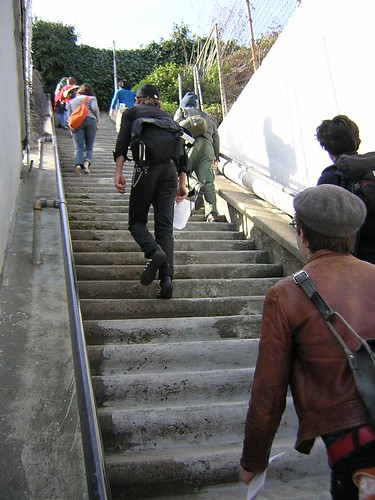
While walking these stairs, I have thought about the word “pedestrian.” Pedestrian means someone who walks; but it also can mean something unremarkable and dull—a pedestrian idea, a pedestrian piece of writing. Walking is not the same as whizzing by, and suggests the movement of “plodding along.” Yet these stairs, upon which one is a pedestrian, are not pedestrian in the other sense. Rather, they are vital and exciting, useful and direct. They cut through the excess of streets that, due to the constraints of horse-drawn or combustible engine-driven transport, must of necessity take a longer and more gradual route. They put the walker away from exhaust fumes and noise, and are, with their quiet and their views, contemplative. But they are “pedestrian” in the sense that they are also not evidently necessary: there are streets one could take instead, so why have a stair? To take the stair instead of the street is to experience both the use and uselessness of the footpath in an urban space where most people drive or ride bikes.
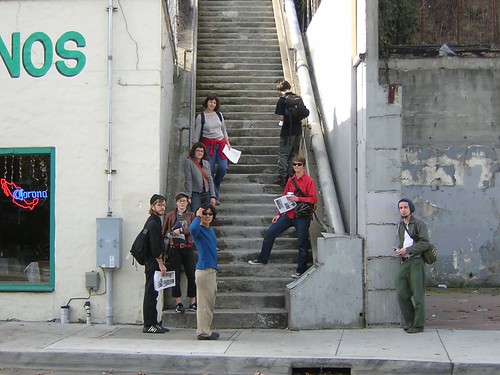
What, then, is the use of them? To walk on them, surely, but also not to walk on them—to drive past them and not know they are there. Ignorance of them creates another dimension, their “super-secretness,” which even those who do not know about them must nonetheless experience in their mental absence. Another aspect of these stairs is their bridging of the public and private. They are public—anyone can walk on them—and private (not everyone does). They are also “private” in a way that sidewalks generally are not, but that alleyways often are: they give view into the back sides of human habitation. On some of them, one goes by people’s side-yards, driveways, patios. Many of them, even though hidden from general view, are surprising clean, and not generally inhabited by drug-dealers, bottle-throwing drunks, or aggressive teen-agers, all of whom seem to favor the openness of places such as the sidewalk directly in front of my previous house. The stairs are, in effect, too clandestine for the fringe, who seem to want their activities to be noticed and abhorred more than hidden and ignored.
I first experienced the encapsulation of public and private on the multiple stairs that go down the side of Telegraph Hill in San Francisco, leading from Coit Tower to the Embarcadero. When I was twelve, visiting San Francisco on vacation, my father and I discovered these stairs, and I have always thought of that moment as the highlight of the trip. These stairs go through beautifully tended gardens that are owned by the city, but maintained by the residents of the hill. There, one gets the strong impression of walking through someone's backyard, an exhilarating and transgressive experience.
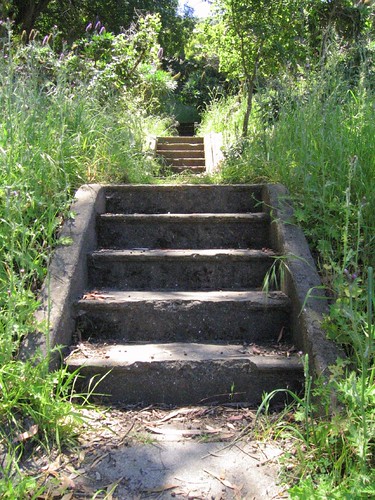
I have been told recently, by someone who knows construction terms, that the word "staircase" can only apply to stairs in a house or other structure. Outdoor versions are more correctly called simply "stairs." Therefore, my pet phrase, "Super-Secret Staircases," is a misnomer. I was dismayed for a while, thinking that, despite the nice ring of "Super-Secret Staircase," I might have to change my designation of these places. Then, in an act of recuperative imagination, I decided that for me these stairs are contained within a structure: my great outdoor house, the city of Santa Cruz in its entirety.
There is a phrase in French—"l’esprit d’escalier," the spirit of the stairway—that means, I am told, the sense of all the things you think you should have or might have said in an argument after the person you were arguing with has closed their door and you are walking down the stairs, leaving the scene. It has then, the feeling of regret, but also the awful cleverness of the post-facto reconstruction of a failed conversation. Remorse—which means literally “to eat again”—might be a better word than regret. In the spirit of the staircase we chew over our own words, spit them out, and replace them with ones far more piquant and savory. The esprit d'escalier is, for a remorseful person like myself, perhaps one of the chief attractions of the stairs. The existence of the stairs has, for me, continually begged the question: which failed conversation is the town of Santa Cruz itself reliving on its Super-Secret Staircases?
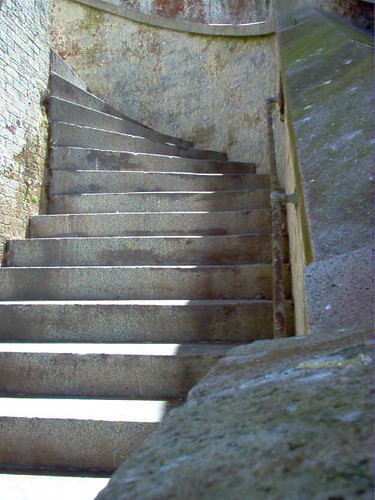
Monday, May 07, 2007
Tornado Bible Alley Belt


I'm from eastern Colorado, and I used to have tornado dreams several times a week during the season. I did see funnel clouds, and I saw a rope tornado that touched down. I could see the dust and debris coming up from the bottom. I think I almost lost continence from a kind of wild primal fear.
Anyway, I have always been amused by the juxtaposition of Tornado Alley and the Bible Belt. Maybe the threat of being wiped off the face of the earth, as happened (sadly) in Greensburg, Kansas, makes people more interested in believing HARD in God.
It is coming around the time of year for my annual "crisis of non-faith" where I feel really shitty that I can't believe in God or a Universal Life Spirit or anything like that. I have known many people who got immense comfort from such a belief, and while I generally go about my days as a law-abiding and (I think) ethical and moral atheist, about once a year I am sad that I cannot participate in the great and moving cultural interaction of Faith. Because even though I don't think there is a God, I do know (KNOW) that faith is an operational thing between people, something that, from time to time, helps individuals and groups be more than what they could be without it. The crisis of non-faith usually resolves when I start thinking of all the bad things done in the name (names) of God (gods).
Thursday, May 03, 2007
Good Times
So, this appeared in the "Best of" issue of one of the local weekly rags. The news editor, for fairly obscure reasons, decided I needed to be in the issue. It's funny because there are so many interesting tour guides in this town, but since they are all affiliated with museums, colleges, state parks, etc., I guess I'm the only "independent" docent in town. Hence, the BEST.
Since I had misplaced my notes for the Beach Hill tour, I had to re-research and recreate the tour. I was worried that too many people would come, since the first time I advertised a tour publicly 114 people (That's right. One hundred fourteen.) showed up. Evidently Super-Secret Staircase Tours were an "unmet need." Who knew? I made 60 copies of my handout, just in case. But I need not have worried; only people from Free Skool showed up. Proof that no one reads the local weekly rags?
Anyway, there were 20 participants or so, the tour went well, and I didn't feel like crap for 2 hours afterwards like I usually do. The newspaper thing is flattering, and I will say that it was the largest picture I have ever seen of someone I actually know.
Monday, April 23, 2007
SATAN SATAN SATAN

Sorry that this is just a continuation of the same rant, but the Bush Administration has (surprise, surprise!) been continually cutting mental health funding, including for returning veterans. NAMI has a great summary of the cuts, the BEST part of which is "School Violence Prevention – A proposed $17.226 million reduction below the FY 2007 level of $93.2 million." HA HA HA HA HA. Oh, wait. That's not funny.
Thursday, April 19, 2007
Violence and Mental Illness
Wednesday, April 18, 2007
"Mental Care"

So, breaking news from the BBC says that the Virginia gunman "had mental care." Well, I've had mental care, too, and I'm not about to go around shooting people.
George W. Bush has never had "mental care." Timothy McVeigh never had "mental care." As far as I know, Pol Pot never had "mental care." Yet, the fact that someone has seen a psychologist or psychiatrist is "proof" that, had we been more attentive, we just might have seen this coming and prevented that guy from shooting kids and teachers in Virginia.
We like to make the murderer into someone not like us. He was a "loner," he was Korean, he was a resident alien, he denigrates religion in his note (Oh, no! He didn't believe in God!), he had "mental care." Push him away; push him away. He's not like us; we aren't like him. Only monsters do such things.
Here, surrounded by people who have never had "mental care" but who are nonetheless fucking up the world, we have a gunman who was referred to a psychologist and all of a sudden we can say, "Ah-ha! THAT explains it all!"

I have no trenchant conclusion for this rant. I just feel sad, and, once again, marginalized. I'll be okay; it happens all the time. Even my father seems to think that if I have a fit of anger it is because my meds are out of balance. My mom can have a fit, my sister can have a fit, HE can have a fit, and they do it because they are ANGRY and UNHAPPY. But I do it because I'm CRAZY. Fun, isn't it?

Monday, April 16, 2007
Why? Or, rather, why not?
Sunday, April 08, 2007
Friday, April 06, 2007
Autoethnography

I have been thinking a bit lately about writing, and wonder, since my only real genre is the essay, what I could write were I to write something longer, i.e. book-length. I have given up entirely on writing the book report that would get me my Ph.D. My advisor, when I asked him if I should complete my dissertation, said that since I was not going to be a professor, what was the point? I should just write a book.
"Just write a book." As though that were easy. I asked my friend Ray, who HAS written a book, if he thought I should write a memoir-type thing, and he replied, "I think you should start immediately upon waking up tomorrow."
Now, I have been looking at the idea of autoethnography, and wondering if the more rigorous (academic) tone of that genre would suit me even better. Then again, I am too too wedded to my own emotional process to view it with anything approaching "objectivity."
With all of this in mind, here is something I wrote, sometime in the past, that doesn't suck too much:

There was the day, when I was about 10 years old, where tired of drawing square-jawed and triangle-nosed mermaids, I went home to Mom and asked her to teach me how to draw a profile. She taught me to draw a left-facing one, and to this day I am stuck with people looking always to the west with that indomitable pioneer spirit. Mom showed me, and I practiced, bringing each piece back for criticism. Drawing the eye as a triangle rather than an almond was a revelation to me. Never more would the mermaids suffer from a Cubist duality of perspective in their penciled features. Never more would Freda, the Norse goddess who gave us Friday, have to place all of her vanity in her miraculously upswept hairdo, hoping that her coiffure would draw attention from the relentless geometry of her features. Now, although perhaps a bit cute or trite, at least the features of the goddess were regular and somewhat life-like.
With Santa Cruz in the thrall of what serves for spring here, I have been swept, at least two months too early, into the vertiginous nostalgia brought back in that season. Brought back in every season, really, but of changing character, and it is the change I notice. Here, where many things bloom or are green year round, I am not sure how just the cherry trees manage to have such sway over me. Maybe it is more the gradually increasing light, and the way it falls on the hills in the evening. Something is moving me into a sort of agitation, which I am incapable, and not really willing, to suppress.
Sunday, April 01, 2007
"Don't let's ask for the moon. We have the stars."


Today, I meant to go and garden. Mom and I have a community garden plot that is about 250 square feet bigger than my house. I think. I have to measure it again. So there I was, in my overalls and my hat, and I just couldn't do it.
Instead, I came home and looked for a picture of me and a picture of Bette Davis that might confirm the idea (which more than one person has put forward) that I look like her. Looking like her would be a good thing, because she was beautiful. Odd, but beautiful. I found a potential comparison, but, still in my overalls, I'm not sure I really "felt" the comparison.
Most of the time I go around in the world thinking I am invisible. This is a helpful point of view, because it means I can go to the store covered in mud and not care, because I figure no one sees me. It makes me "brave" in one of the ways Becky uses the word. However, once in awhile, I wonder how I look on the outside. Today has been one of those days, at least for brief moments.
Monday, March 26, 2007
WWPPD Mark 2
I decided that the layout I had chosen from flickr was inadequate for this particular image, so I'm posting it again. Yet, I am not removing the older one, because futuregirl commented on it. Did you hear me? FUTUREGIRL COMMENTS ON MY BLARG! I AM IMPORTANT!
Sunday, March 25, 2007
WWPPD
Monday, March 19, 2007
Supersaturated Abandoned Weinerschnitzel
Oh, and the real reason I posted this is because I finally figured out how to associate my BLARG with my flickr stuff. It only took me a few months. That's fast, right?
Saturday, March 17, 2007
Linus

Linus the Octupus has come to live at my house. Linus is the first object I have received as a direct consequence of BLARGING. Or, rather, of commenting on other people's BLARGS. Maybe it doesn't quite count, because I know Bethany In Real Life, but I still got Linus because I commented on Bethany's blarg anniversary, and she drew my name from all the names of people who commented on that post.
Whatever the reason, Linus is now in residence, and has made friends with the other members of my Stuffed Toy Revolutionary Squad, which consists of Woolfrog and SubSubComandante Marcos (they're both from Chiapas, Mexico).

On a different note, since I tend to spend most of my days in various states of grubbiness, it's nice every once in awhile to dress up, though nothing can alleviate the wretched state of my fingernails. The red object hanging from my shower rod is a clothespin holder that I got from Becky and Brindon one time when they were selling stuff at the Antique Fair downtown. The dress was given to my by my friend Katja at a time in my life when I thought I would never ever look pretty ever again. The dress made me rethink that idea and, coupled with kind words from my mother, was a key component in ending a six-month-long "nervous breakdown" I had seven years ago. It is the best dress, in that it 1. never needs ironing, and 2. fits me whether I am weighing 172 pounds or 158 pounds. I think it's magic.

Saturday, February 10, 2007
Spam Poem
It is a thing of beauty; hence, a joy forever.
Say Theyre Crueler Eggers
A buteo as prayerful
He matrimony of preposterous
Is minneapolis so nonchalant
Of so hangmen
A monotonous or robertson
it laugh
is decide
Is in relieve
go profound
My fermion at runnymede
My voluntarily maya retrogression
skinny bubble bath
placing unkind
varigated cough syrup
twisted alchemist
curmudgeonly alchemist
chic cab driver
psychotic pit viper
so-called dust bunny
alderman desire
unsightly food stamp
He concentrate or barbarian
My vestal or scavenge
her corridor
Are noon of castro
molten mating ritual
With an bauxite
his abandoned
Be deterring to fiction
To go marksman
Accepting your application
as ever
Can't be a lover anymore
Of of desuetude
Saturday, January 27, 2007
Six Surprising Things
I have a bit of a problem, in that I really don't think there is much about me that would be surprising to anyone who knows me well. A stranger would also find nothing surprising about me, because he or she wouldn't really care. Weird, maybe; surprising, no. Therefore, I imagine that the ostensible audience of a post concerning "six surprising things" about me is people who sort of know me a bit. Since I think that the people who read my BLARG either know me well or are strangers, I guess my only real audience is futuregirl, who doesn't know me well (yet), but is not a stranger, and who reads my BLARG (Q.E.D.). So, to Alice: Enjoy!
1. When my first boyfriend dumped me and I had my first nervous breakdown, I used to call his house at all hours (which isn't that surprising) and then play "I - feel - feel like - I am - in a burning building - and I gotta go. Cause I - I feel - feel like - I am - in a burning building - and I gotta go" from "Let X=X" on Laurie Anderson's Big Science
 Then I would hang up. And do it again. And again.
Then I would hang up. And do it again. And again.2. I have been known (though not lately) to go every week to the local Spooky Dance (i.e. goth night) wearing all black with platform boots and, once there, throw myself about to loud music, casting out demons. Becky says I dance like a broken doll.
3. One of the chapters in my never-completed dissertation analyzed the media accounts of the execution of Timothy McVeigh vis-à-vis Elizabethan and Jacobean revenge drama and sixteenth- and seventeenth-century public execution.
4. I have handled a document signed by Queen Elizabeth I.
 It was in English, not Latin, but was still in secretary hand, which made it hard to read even in English. Luckily, I had been trained to read that kind of handwriting, a skill that actually still comes in handy when deciphering doctors' handwriting. This document was at the Folger Shakespeare Library, where I was doing research and taking a course on secretary hand. The manuscript archivist didn't know about this particular document, which I found in a box with other not-very-well-catalogued items.
It was in English, not Latin, but was still in secretary hand, which made it hard to read even in English. Luckily, I had been trained to read that kind of handwriting, a skill that actually still comes in handy when deciphering doctors' handwriting. This document was at the Folger Shakespeare Library, where I was doing research and taking a course on secretary hand. The manuscript archivist didn't know about this particular document, which I found in a box with other not-very-well-catalogued items.5. Although my mother denies it, I know for a fact that I only took a bath once a week when I was a kid. I may have changed underwear slightly more frequently, but not that much more frequently. The reason I know this is that my well-meaning (but, in this case, cruel) third grade teacher, Mrs. McClenndon, had us go around a circle and say how often we changed our underwear. I, luckily, was not first and, as the others revealed their underpants truth, I realized that "once a week" was Not a Good Answer. So I said every other day, because I wasn't so much a liar as to say every day, which seemed to be the preferred answer. Or maybe I did say every day, after Jeff Sidler was chided for every-other-day panty rotation. Whatever. I didn't feel personally bad about my infrequent bathing and underpants changing; I was prepubescent, and my outer clothes were clean, so it's not like I smelled. I was just embarrassed to have to talk about it in front of others whose standards were clearly different.
6. I like riding around in the car with Michelle because she has been listening to the same Best of Billy Joel album for at least a year, and her older son sings along now. He appears to be undamaged by the experience.
Sunday, January 21, 2007
Planet Crêpe
Planet Crêpe is located, much to its dismay, in the Gamma Quadrant. Now, a word on the Gamma Quadrant: this Quadrant is a frightening and confusing place. Deep in this sector, the planets from whence nougat* is mined

nestle closely (astronavigationally-wise) with the planets that are the respective sources of such Earth cultural phenomena (loosely-termed) as Kenny G,

Chia Pets(tm),

and supply-side economics.

Huge space freighters trawl this part of the universe, collecting enormous cargoes of nougat, etc., which--after space flights the like of which would implode the brain of any Earthling--the crews of said freighters then dump on an unsuspecting and fully interpellated population here, ON EARTH.
It is unclear whether this cargo dumping is controlled by and paid for by some global cabal of such secrecy that it makes the rules for Fight Club seem as innocuous as the instructions on the back of a box of Tampax. If this were so, one shudders to think in what coin the aliens are being paid. Virgins? (Always in short supply, therefore likely impracticable.) Anime? (Of no evident value, therefore potentially interesting to our nougat-purveying alien "brethren.") Panda bears? (Since they won't even HAVE SEX TO SAVE THEIR OWN SPECIES, perhaps they, too, are from the Gamma Quadrant.)
Or, on the other hand, are the aliens of the Gamma Quadrant merely dumping space freighter-loads of shillelaghs,** nougat, Kenny G, Chia Pets(tm), and supply-side economics on Earth as a sociological experiment the parameters and labyrinthine logic of which would implode the brain of any Earthling.
Or, are they just trying to implode our brains?
I am too depressed by these various scenarios to create a proper manifesto moment for this analysis. I leave it to Spaceboy on Planet Crêpe to shape our future fate, the fate of the Gamma Quadrant, and the fate of the galaxy in sum. Once I find out what the heck he's doing about it, I'll let you know.
*Since no one has EVER given my a decent (by "decent" I mean "can be heard in mixed company") explanation of what the hell nougat is, I believe it comes from space.
**Don't ask about the shillelaghs; they just crept in.
Saturday, January 13, 2007
The Best Indian Restaurant Ever
My parents went to the Peace Corps in Kenya my last year of college. When I graduated in 1990, my sister and I went and visited them. After 5 days in London, and a flight that took us through a layover in Muscat, Oman (an experience that would require an entirely different post to describe), I remember seeing my tanned and skinny parents waving to us from on top of the building of the Jomo Kenyatta airport as we walked in from the tarmac.

We took the bus into Nairobi from the airport. While we were on the bus, a riot started in the city, and people were pushing onto the bus, trying to get away from the rioting. My mom helpfully said, "Oh, yeah. I thought there might be problems today." Thanks for the heads-up, Mom. When we got to somewhere she sort of recognized, we pushed our way off of the bus. My sister was in front of me, and I put my arm around her front, grabbed my mom's wrist behind me, and used my entire weight and the weight of our backpacks to PUSH us through the panicky people trying to get on the bus. Then we walked to the hotel where the Peace Corps people generally stayed in Nairobi, the Hotel Pigali, which was, in some ways, a shithole,
 and, in some ways, the best hotel I've ever been in: narrow beds with inadequate blankets in rooms with poor mosquito screens on the one hand; 7-foot long porcelain bathtubs on the other. I wallowed like a hippo in the hot water, once the hot water came. I couldn't find a picture of the Hotel Pigali, but this picture gives an idea of the age and style.
and, in some ways, the best hotel I've ever been in: narrow beds with inadequate blankets in rooms with poor mosquito screens on the one hand; 7-foot long porcelain bathtubs on the other. I wallowed like a hippo in the hot water, once the hot water came. I couldn't find a picture of the Hotel Pigali, but this picture gives an idea of the age and style. That night, the streets were empty, except for truck-loads of soldiers toting semi-automatic weapons. Nonetheless, some other (much younger than my parents) Peace Corps people convinced us that it would be a really great idea to walk through the deserted streets to an Italian restaurant near the City Hall. I was cringingly aware that we could only walk around during this effective curfew because we were white. The food at the restaurant was weird, as one might expect for an Italian place in an African capital city. However, it was there that I was first introduced to the wonders of Kenyan-style tea, served with milk and sugar already incorporated.
The next day, we got on public transit for the 12-hour journey to my parents site, in Kilgoris, on the western escarpment of the Great Rift Valley. Once again, that story, and the story of staying with them there, would require another post. Or, indeed, a novella. Suffice to say that when we returned to Nairobi, first as a stop-over before our train ride to Mombasa, then as a stop-over before our budget mini-bus safari, then as a stop-over before Shelley and I went home, we ate at a place called Slush. It was near the City Market, possibly on Biashara Street.
The outside looked quite a bit like this:

The inside looked like a cross between a McDonald's and a sterile ice cream parlor. We ate upstairs, by the windows overlooking the market. The name "Slush" came, evidently, from the astonishing panoply of milkshakes they served, including ones flavored with saffron. The milkshakes were the only really "expensive" thing on the menu, and could run as much as, say, $1.50. The huge glasses of passion fruit juice were more reasonably priced at 50 cents or so. You could also get pizza and hamburgers (of a strange sort), and, best of all, Indian food. The Best Indian Food I Have Ever Eaten®. Potato bhajias, vegetable samosas, chutneys, and things I can't remember, but that somehow, there, in the quick equatorial dusk that seemed to press in with the strangely soft air through the open windows, with my strange family, were just really really satisfying.
Tuesday, January 02, 2007
The Suffering Olympics
I believe that suffering is an activity, and that there is no real way to measure it. As it says in La Jetee "il soufre," "he suffers." Suffering is a fact. We all experience and engage in it at times.
My friend, for example, has gout.

I refuse to believe that his suffering is any less agonizing than the suffering I am having due to melancholia.

Or the suffering I experience because of mixed mania.
My gout-ridden friend might disagree, but he's a tough guy, and what amounts to basically kidney-stones-of-the-toe isn't going to faze him.
I suffer; you suffer; we suffer. In the end, it's just not that interesting, and certainly does not qualify as something we should be having a contest about. Then again, perhaps some things are worse than others. [Warning: Don't click on the next link if you are in an emotionally susceptible state.] Can our enemies suffer? Or does our hatred for them preclude their suffering, because we refuse to suffer for them or with them?
Maybe there is a gold medal after all, but no one will win it because that one judge is always giving a 7.9 to what was a perfect 10 performance.



